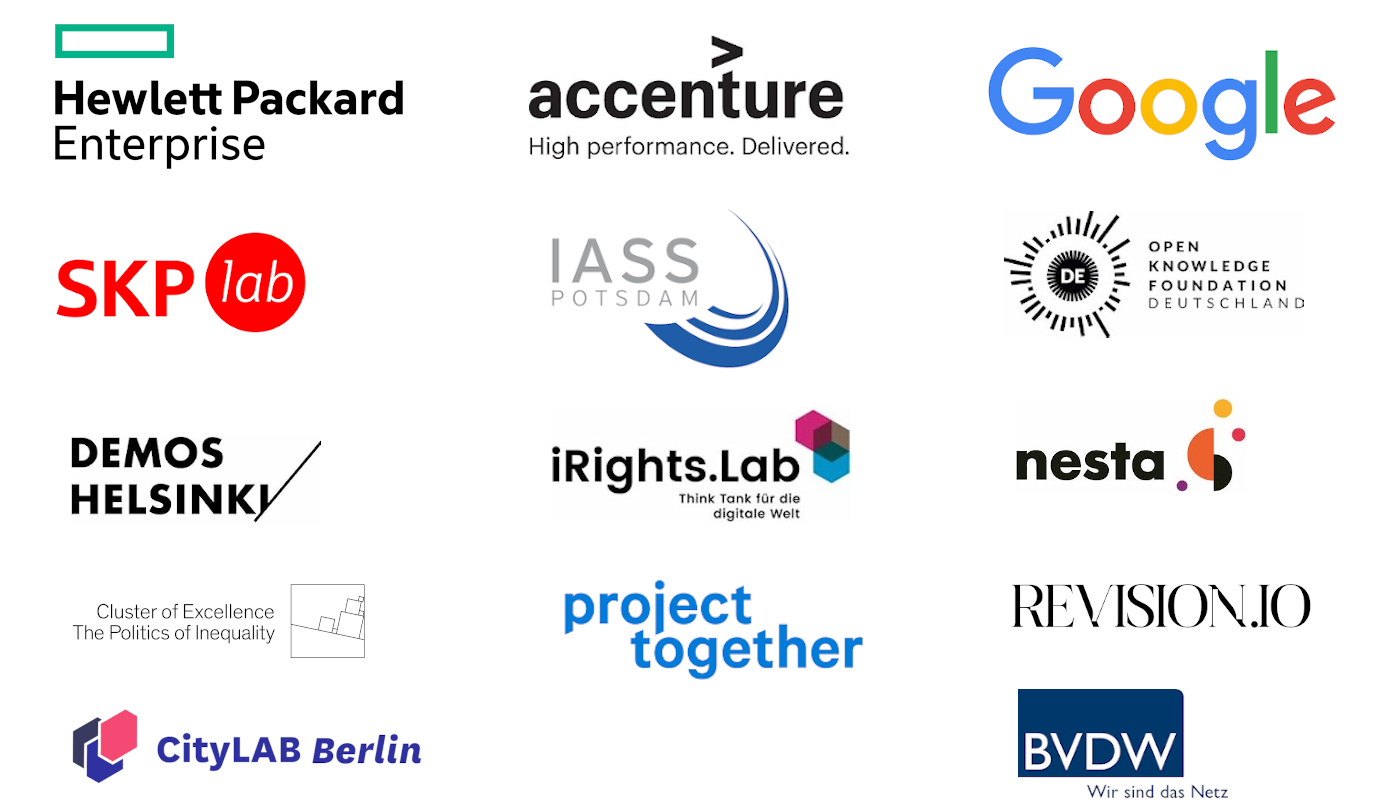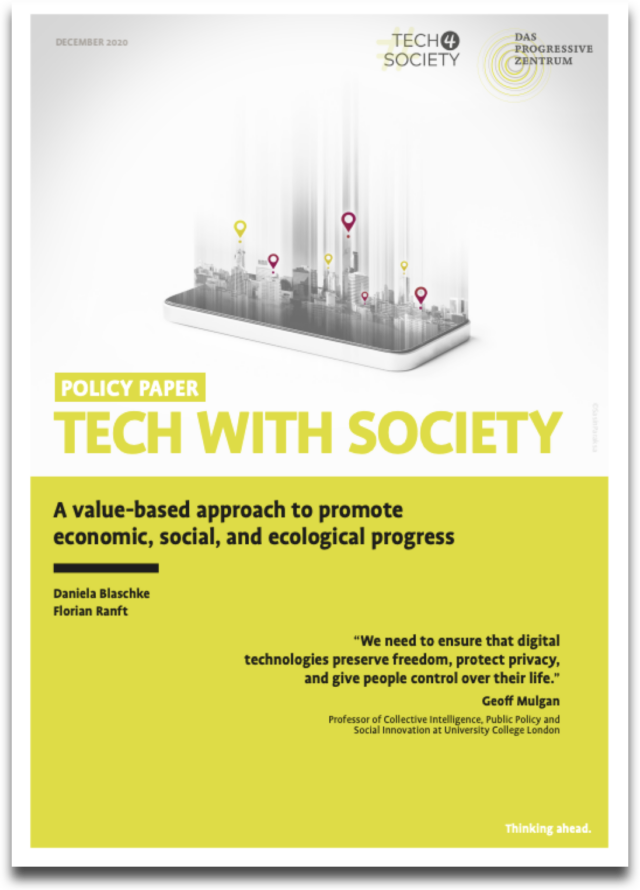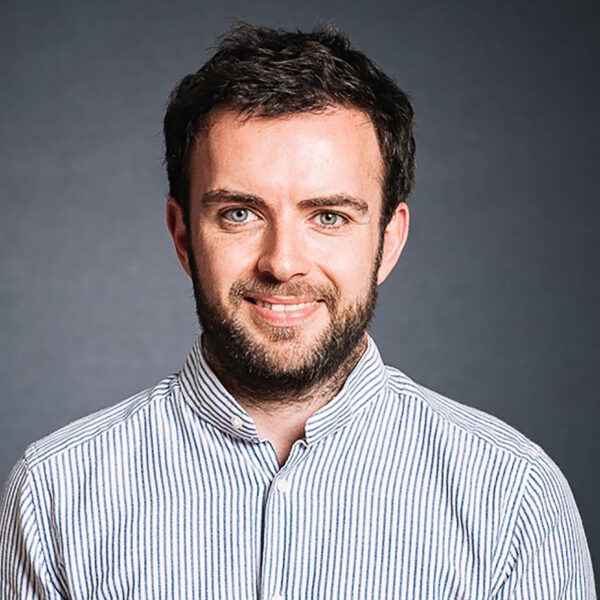Summary
How can a value-based approach to technological change promote economic, social, and ecological progress? How can the public and the private sector harness new technologies to boost innovation and provide social benefits to society at large? At the #Tech4Society Policy Paper Launch on 16 December 2020, we discussed these and other questions with Julia Borggräfe, Joanna Bryson, Thomas Ramge and Rasmus Rothe.
The policy paper “Tech with Society – A value-based approach to promote economic, social, and ecological progress” concludes the #Tech4Society workshop series, putting forward policy recommendations designed to ensure that technological change will not be an end in itself — and that actors from civil society, politics, business, and academia will instead be able to develop a European model of generating value based on co-creation.
The paper discusses the latest developments and challenges at the level of the economy, society, and the individual and develops 12 policy recommendations for a value-based approach to technological change.
At the heart of the Policy Paper Launch was a discussion with tech experts, politics, and academia about the approach as well as recommendations and conclusions developed by the #Tech4Society consortium. Following a presentation of the paper by Daniela Blaschke, Policy Fellow at Das Progressive Zentrum, we asked the experts for comments on both the analysis and the deductions made, on what was missing and what should be elaborated further.
The debate was chaired by Thomas Ramge, author of “Reinventing Capitalism in the Age of Big Data”, Technology Correspondent at brand eins and Contributing Editor at The Economist. The discussants were:
- Julia Borggräfe, Head of Department “Digital Transformation of the World of Work”, German Federal Ministry of Labour and Social Affairs
- Joanna Bryson, Professor of Ethics and Technology, Hertie School
- Rasmus Rothe, Co-founder, Merantix
Participants had the opportunity to follow-up on the experts’ remarks on the paper in three Deep Dive Rooms.
Developing a co-creative innovation ecosystem
In their inputs, all three speakers supported the policy paper’s call to action for developing a co-creative innovation ecosystem in Europe.
Rasmus Rothe underlined the importance of co-creation processes between companies, government, and civil society, as he argues that it is the only way we can succeed in bringing AI to society and the individual. For this to work, co-creation must not only be a label but become a mindset, e.g. for people in the public service, as Julia Borggräfe pointed out. Joanna Bryson further emphasised that we should not only be talking about innovating tech, but also about shaping and creating society:
“A lot of disruption is not only about big tech, it’s about inequality.”
Joanna Bryson
As Bryson pointed out, it is difficult to bring society together if large inequalities persist. Therefore, if we want to ensure investment in the common good, we need to get on top of redistribution, for example through infrastructure. How the developments of technological change play out, depends largely on how we deal with them. As Borggräfe put it:
“The coronavirus crisis accelerates technological transformation, but its development still depends largely on how we deal with it. The transformation is not given to us – we need to shape it.”
Julia Borggräfe
We need to ensure that especially the future development of AI is based on a broad social discussion process and is thus largely directed towards the needs of the people and the common good, Borggräfe said. At the same time, we should not solely focus on AI, as it is just one relevant form of technology among others.
A human-centred approach to technology
As technology is only a means to communicate our values, Bryson argues, it is essential that we adopt a human-centred perspective when talking about technological change. The question is therefore not only how we build technology well, but also how we can use it to enable new ways of interacting and to preserve or improve the current forms of interaction we perceive to be important.
Here, a particularly significant issue is the question of how to integrate actors from civil society into a European innovation ecosystem, for example how to get ordinary users for testing new technologies. Another important issue concerns the question of politics and the organisation of international relations.
If we want the next tech companies to be built according to our values, Rothe emphasised, we need to make sure that they are built in Europe. As the policy paper stresses, Europe should build on its comparatively strong ability to make decisions based on consensus. Yet, this must not mean that Europe should follow a path whereby it creates innovation in tech alone. Instead, it should also explore the opportunities of knitting stronger ties with the US and the incoming Biden administration.
A “grand bargain” in tech over research development, security, taxation, and data rights between the EU and the US (and other democratic allies) could strengthen liberal democracy and put an end to the German state playing catch-up in regulating big tech and the internet. However, as Bryson especially underlined, it is important that we don’t only think in one direction, towards the US:
“Don’t only look west. Please look south and east.”
Joanna Bryson
Background on #Tech4Society
Together with a diverse consortium of partners from academia, civil society, the public and private sector, the #Tech4Society innovation series explored the possibilities of a value-based approach to technological change with the goal of social and ecological progress at its core. It engaged with the question of how new technologies can help address the key challenges of our time by consecutively taking into account the perspectives of the economy, the society, and the individual.
The #Tech4Society Consortium:

Authors
Mir reicht's Bürger
Progressive Governance: Rise or Demise – How Democracies Can Withstand Authoritarian Attacks
Onwards and Upwards
Die Übergangenen – Strukturschwach & Erfahrungsstark
Innovation als Schlüssel zur gerechten Transformation
Tech with Society
Which Tech Does Society Need?


Wir entwickeln und debattieren Ideen für den gesellschaftlichen Fortschritt – und bringen diejenigen zusammen, die sie in die Tat umsetzen. Unser Ziel als Think Tank: das Gelingen einer gerechten Transformation. ▸ Mehr erfahren



